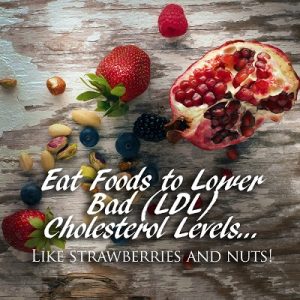High Cholesterol
 Low-density lipoproteins (LDLs) are evil. That’s what you have been told for years, maybe all of your life. Nutritionists, health gurus and doctors, will all tell you that if you keep your LDL cholesterol level low and your HDL level high, you will be a happy, healthy human being. This is partially correct.
Low-density lipoproteins (LDLs) are evil. That’s what you have been told for years, maybe all of your life. Nutritionists, health gurus and doctors, will all tell you that if you keep your LDL cholesterol level low and your HDL level high, you will be a happy, healthy human being. This is partially correct.
LDL is not cholesterol. LDL stands for low-density lipoprotein. This is a type of protein which carries cholesterol throughout your body. You need cholesterol for many health processes, and this fatty looking substance is literally found in every single cell in your body. HDL and LDL, when they exist in the correct ratio, work together to transport cholesterol to all of your body parts and cells that need it.
The reason why LDL is seen as a “bad cholesterol” is because of what happens when you have too much of this protein in your body. LDL can cause plaque to buildup in your arteries. Your arteries exist to channel blood from your heart throughout your body.
Healthy, oxygenated blood is needed in high supply by every part of your body. From your head to your toes, from your brain to your feet, you need a constant supply of oxygen-rich blood so you can think, move and exist. Continue reading
 The things you eat can make you healthy or unhealthy. For most people, diet is the single biggest factor affecting their health. Everyone loves talking about eating and foods, so we will get to that in a minute. Plus, even many kids these days know to watch their good and bad cholesterol levels.
The things you eat can make you healthy or unhealthy. For most people, diet is the single biggest factor affecting their health. Everyone loves talking about eating and foods, so we will get to that in a minute. Plus, even many kids these days know to watch their good and bad cholesterol levels.
First, let’s discuss cholesterol, exactly what it is, and then look at some foods you should be eating to keep your cholesterol levels healthy and also raise the good cholesterol levels.
Cholesterol is a waxy, fatty substance and is naturally found in every cell of your body. If this is a natural component that is found in all of us, in every cell, why are we told it is a bad thing? Let’s take a look.
Understanding Cholesterol
There are 2 different components of cholesterol which naturally exist in a healthy ratio. Your body makes plenty of cholesterol on its own, and you use this to make vitamin D, hormones and some of the substances and chemicals that help you digest food. Continue reading






